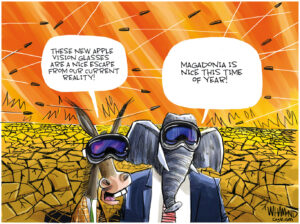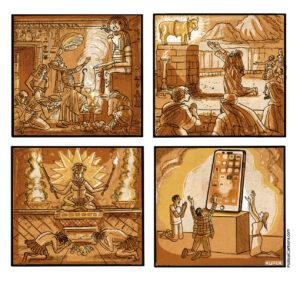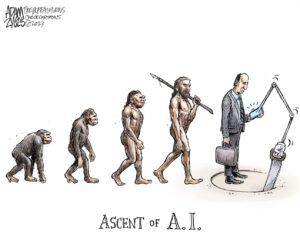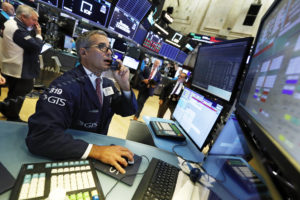The Blood in Our Phones
A lawsuit filed by the Democratic Republic of Congo seeks to hold Apple and its suppliers to account for decades of profiting off conflict minerals. In this composite image, Apple CEO Tim Cook speaks before an image of a woman in the Democratic Republic of Congo. (Graphic by Truthdig. Images via AP Photo)
In this composite image, Apple CEO Tim Cook speaks before an image of a woman in the Democratic Republic of Congo. (Graphic by Truthdig. Images via AP Photo)
The government of the Democratic Republic of Congo is bringing criminal complaints in Europe against Apple, the tech giant, charging it with sourcing materials for its electronics in ways that contribute to vicious violence in the war-torn eastern DRC. In part, the lawsuit accuses Apple of acquiring Congolese minerals that have been illegally smuggled through Rwanda, which borders DRC to the east. Apple denies the charges.
So far, the mainstream U.S. media is mostly ignoring the story, continuing its decades-long indifference to what continues to be one of the greatest humanitarian disasters since World War II. As many as 6 million people may have already died in a zone that has become one of the most dangerous places on the planet; since fighting broke out in 1998, more than 5.6 million have been displaced. The U.S. and the European Union have largely ignored the violence, along with Rwanda’s complicity in looting DRC’s minerals.
On Dec. 17, Amsterdam & Partners LLP in Washington, D.C., and two other law firms representing Congo’s government charged Apple in Belgium and France with what they call “the contamination of Apple’s supply chain with ‘blood minerals’ sourced in sub-Saharan Africa.” Efforts to solicit a response from Apple’s corporate headquarters in Cupertino, California, went unanswered, but the tech giant has released a statement insisting that in 2024 it ordered its suppliers to stop importing minerals from the region. The DRC’s attorneys responded that Apple did not specify a date when this alleged ban was ordered. If it did occur, it was apparently never announced publicly.
The lawsuit accuses Apple of acquiring Congolese minerals that have been illegally smuggled through Rwanda.
The key minerals are tungsten, tin and tantalum, sometimes called the “3 Ts.” On paper, an independent monitoring system is supposed to ensure that companies sourcing them are not contributing to regional violence. The International Tin Supply Chain Initiative (ITSCI) was set up in 2009 to conduct inspections across the region. But Global Witness, the legendary investigative agency headquartered in London, issued a report in April 2022 that found those inspections to be a sham. The watchdog group discovered that minerals that are tagged as being exports from Rwanda are in fact illegally snuck in from the DRC.
“A key person involved in setting up the ITSCI scheme in Rwanda estimated that for some years only about 10% of the minerals the country exported were actually extracted there, with the rest being smuggled in from DRC,” Global Witness’s report said.
The smuggling prevents the DRC, one of the poorest nations on Earth, from taxing its major export, revenues from which could help build its ramshackle health and education systems, and construct a professional army to help quell the violence.
In the end, European courts will have to decide whether Apple was complicit in this large-scale looting. Meanwhile, the DRC lawsuit should finally shine a global spotlight on Rwanda. The country sponsors a vicious armed proxy inside the DRC’s borders, called the M23, which Human Rights Watch and others have found responsible for massive rights violations. On Jan. 4, the M23 seized control of Masisi, another Congolese town. In addition, Rwanda itself has stationed as many as 4,000 troops in the eastern DRC, and some experts are starting to believe that it’s planning to annex Congolese territory.
Despite a horrendous human rights record — including a global assassination program targeting dissidents as far afield as South Africa — Rwanda and its leader Paul Kagame still enjoy a positive reputation in the U.S. and Europe. Kagame just won another election last July, (with a suspicious 99.18% of the vote). At the beginning of his long rule, he played successfully on Western sympathy because the rich world had done nothing during the 1994 genocide. More recently, though, as the genocide fades into history, Kagame has found new ways to appeal to the U.S., Britain and France. Michela Wrong, a British reporter and author of “Do Not Disturb: The Story of a Political Murder and an African Regime Gone Bad,” told me that Kagame is one of the “cleverest and most astute” of all African leaders. “One of Kagame’s real skills is identifying what matters to the West, what are their primary concerns of the day,” said Wrong. The U.S. sends some $190 million annually in aid to Rwanda, and European nations add to it.
First, the Rwandan army is regarded as arguably the best trained and most efficient fighting force in Africa, which Kagame has deployed in a growing number of African nations. Over the past decade, home-grown Islamic jihadism has emerged in Mozambique and the Central African Republic, and Wrong explains that Rwandan forces are stationed in both countries to protect Western geopolitical and economic interests. “In Mozambique, the jihadists are threatening an area that has large investments by TotalEnergies, the giant French oil company,” she notes.
Wrong also points out that Kagame has offered Rwanda as a destination for refugees who are flooding into Europe from Africa and the Mideast. Britain even paid him an astonishing advance of at least $395 million to take some of the desperate migrants. Before the incoming Labour government halted the country’s deportation policy, four refugees went from Britain to Rwanda.
In fairness, an end to Rwanda’s alleged looting and violent interference in eastern DRC would not bring peace to the region overnight. There are some 150 local armed groups in the region; some of them have been fighting for decades over land and are motivated by ethnic hatred. The DRC is too poor to finance a proper army capable of bringing peace to the region.
The Global North has exploited the DRC for more than a century.
The harsh reality of mining in the DRC further complicates things for outsiders who want to help. The country has an estimated 2 million “artisanal” miners, who work independently under extremely dangerous conditions. I’ve interviewed some of them in the DRC’s southeast. They dig their own dangerous tunnels 100 feet deep, with minimal safety measures and primitive equipment. They extract ore and sell it to middlemen, who then put it into international supply chains that end in the manufacture of our computers, cellphones and electric vehicle batteries. Artisanal miners regularly suffocate in cave-ins or from breathing dangerous fumes.
Apple’s announcement that it allegedly has (or will) stop sourcing minerals from the region may seem like a partial solution, but it’s not that simple. The Global North has exploited the DRC for more than a century, draining its mineral wealth, and the country has never been able to even begin constructing a broader economy. Reducing mineral imports from the Congo will start putting those 2 million out of work before alternatives are in place, thus damaging the even larger number of family members (and local micro businesses) that rely on them. The challenge is to find a more humane way to continue sourcing minerals while safer, more humane and sustainable industries are built up — all without adding to the region’s violent misery.
Stopping Rwanda’s alleged looting would be a major first step. The scandalous silence in the U.S. media about the Kagame regime — with one recent honorable exception, in the Washington Post — includes Philip Gourevitch, whose compelling 1998 book about the 1994 genocide and its aftermath, ”We Wish to Inform You That Tomorrow We Will Be Killed With Our Families,” reached a large audience and helped imprint the Rwandan genocide into the American consciousness. Now a staff writer at the New Yorker, Gourevitch continued to report on Rwanda following his book, with his defenses of Kagame becoming increasingly feeble. But for years now, he has been quiet. His honest assessment of contemporary Rwanda would be a welcome addition to the project of informing the world about the terrible crisis in eastern DRC.
One hopes that putting an iconic American tech giant on trial will generate some long overdue reporting.
Your support is crucial…With an uncertain future and a new administration casting doubt on press freedoms, the danger is clear: The truth is at risk.
Now is the time to give. Your tax-deductible support allows us to dig deeper, delivering fearless investigative reporting and analysis that exposes what’s really happening — without compromise.
Stand with our courageous journalists. Donate today to protect a free press, uphold democracy and unearth untold stories.






You need to be a supporter to comment.
There are currently no responses to this article.
Be the first to respond.